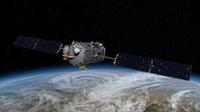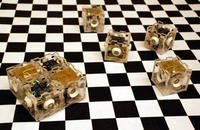-
Groundwater pumping causes sea level rise, canceling out effect of dams
Those in charge of infrastructure protection must now worry about another source of sea level rise: water pumped out of the ground for irrigation, drinking water, and industrial use; this water ends up emptying into the world’s oceans, and scientists calculate that by 2050, groundwater pumping will cause a global sea level rise of about 0.8 millimeters per year
-
-
Groundwater pumping causes sea level rise, canceling out effect of dams
Those in charge of infrastructure protection must now worry about another source of sea level rise: water pumped out of the ground for irrigation, drinking water, and industrial use; this water ends up emptying into the world’s oceans, and scientists calculate that by 2050, groundwater pumping will cause a global sea level rise of about 0.8 millimeters per year
-
-
NASA's new carbon-counting instrument ready for lift-off

Carbon dioxide is the most significant human-produced greenhouse gas and the principal human-produced driver of climate change; new NASA spacecraft will uniformly sample the atmosphere above Earth’s land and ocean, collecting more than half a million measurements of carbon dioxide concentration over Earth’s sunlit hemisphere every day for at least two years
-
-
The American West running low on water
The American West has a drinking problem; on farms and in cities, people who live in that region are guzzling water at an alarming rate; scientists say that to live sustainably, they should use no more than 40 percent of the water from the Colorado River Basin; currently, however, they use 76 percent, nearly double the sustainable benchmark
-
-
Little of Earth’s water is usable in everyday life
Very little of Earth’s water is usable in everyday life; about 96 percent of water on Earth is saline; of the total freshwater, over 68 percent is locked up in ice and glaciers; another 30 percent of freshwater is in the ground; rivers are the source of most of the fresh surface water people use, but they only constitute about 300 mi3 (1,250 km3), about 1/10,000th of one percent of total water
-
-
Panetta: Environment is becoming a national security concern
Climate and environmental change are emerging as national security threats that weigh heavily in the Pentagon’s new strategy; the secretary also said he has great concern about energy-related threats to homeland security that are not driven by climate change
-
-
Bomb-sniffing dogs used in Everglades python invasion

Burmese pythons have invaded the Florida Everglades, adapting well to the Everglades environment; they have also been wreaking havoc with the delicate ecosystem of the area; now, there is a new weapon in the fight against the Burmese python: dogs, trained to sniff out explosives, are being re-trained to locate the Burmese python
-
-
Australians told sweeping economic, societal changes needed to cope with severe weather
The Australian government’s Productivity Commission has just released its much-anticipated report, titled Barriers to Effective Climate Change Adaptation; the report calls for sweeping changes across the Australian economy, including ditching property taxes which discourage people from moving out of areas prone to extreme weather events
-
-
Identifying the sources of global sea level rise
As the Earth’s climate warms, a melting ice sheet produces a distinct and highly non-uniform pattern of sea-level change, with sea level falling close to the melting ice sheet and rising progressively farther away. The pattern for each ice sheet is unique and is known as its sea level fingerprint; now, geophysicists have found a way to identify the sea level fingerprint left by a particular ice sheet
-
-
New monitoring system clarifies atmospheric CO2 questions
Most climate scientists believe higher concentrations of the greenhouse gas CO2 in Earth’s atmosphere are leading to rising temperatures on the planet; trouble is, CO2 is derived not only from fossil fuels, but is also being emitted by biological sources like plant respiration; CO2 released from fossil fuels has no carbon-14, while CO2 emitted from biological sources on Earth is relatively rich in carbon-14, allowing scientists to compare emissions from man-made fossil fuels to biologically emitted CO2
-
-
Border security bill would harm U.S. National Parks: environmentalists
A bill pending in the U.S. House of Representatives would suspend the enforcement of almost all the U.S. environmental laws on all lands under the jurisdiction of the Departments of the Interior and Agriculture within 100 miles of the northern border with Canada and the southern border with Mexico; the 100-mile zone includes fifteen National Parks which cover 21,657,399 acres, or nearly 25 percent of the overall footprint U.S. National Park System; supporters of the bill claim it would bolster border security, while environmentalists say it would gut a century’s worth of proven federal lands protection
-
-
Scientists: Deepwater Horizon exposed gaps in deepwater oil spill knowledge

On the second anniversary of the Deepwater Horizon oil spill in the Gulf of Mexico, a national team of scientists warns that inadequate knowledge about the effects of deepwater oil well blowouts threatens scientists’ ability to help manage comparable future events
-
-
Solar storms and infrastructure vulnerabilities

Space weather, and in particular coronal mass ejections, can cause huge disruption to many highly technological systems on Earth; experts say that vulnerable industries, such as power grids and airlines, should gather more information on space weather in order to make more informed decisions about how to deal with future solar storms
-
-
Himalayan glaciers decline less rapidly than previously feared
Several hundreds of millions of people in Southeast Asia depend, to varying degrees, on the freshwater reservoirs of the Himalayan glaciers; it is thus important to detect the potential impact of climate changes on the Himalayan glaciers at an early stage; together with international researchers, glaciologists from the University of Zurich now show that the glaciers in the Himalayas are declining less rapidly than was previously thought; the scientists, however, see major hazard potential from outbursts of glacial lakes
-
-
Autonomous, self-replicating robots for finding extraterrestrials

Autonomous, self-replicating robots — exobots — are the way to explore the universe, find and identify extraterrestrial life, and perhaps clean up space debris in the process; scientists note that if aliens are out there, they have the same problems we do: they need to conserve resources, are limited by the laws of physics, and they may not even be eager to meet us
-
- All
- Regional
- Water
- Biometrics
- Borders/Immig
- Business
- Cybersecurity
- Detection
- Disasters
- Government
- Infrastructure
- International
- Public health
- Public Safety
- Communication interoperabillity
- Emergency services
- Emergency medical services
- Fire
- First response
- IEDs
- Law Enforcement
- Law Enforcement Technology
- Military technology
- Nonlethal weapons
- Nuclear weapons
- Personal protection equipment
- Police
- Notification /alert systems
- Situational awareness
- Weapons systems
- Sci-Tech
- Sector Reports
- Surveillance
- Transportation
Advertising & Marketing: advertise@newswirepubs.com
Editorial: editor@newswirepubs.com
General: info@newswirepubs.com
2010-2011 © News Wire Publications, LLC News Wire Publications, LLC
220 Old Country Road | Suite 200 | Mineola | New York | 11501
Permissions and Policies
Editorial: editor@newswirepubs.com
General: info@newswirepubs.com
2010-2011 © News Wire Publications, LLC News Wire Publications, LLC
220 Old Country Road | Suite 200 | Mineola | New York | 11501
Permissions and Policies
